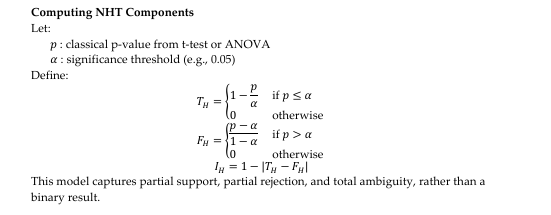A Neutrosophic Framework for Resolving Statistical Paradoxes and Hypothesis Ambiguities in University Music Programs Teaching Quality Evaluation
Keywords:
Neutrosophic statistics, paradox resolution, hypothesis ambiguity, teaching evaluation, triple-state logic, contradiction analysis, uncertainty quantification.Abstract
Traditional statistical methods often fail to capture contradictions and
uncertainties inherent in real-world educational data. In the context of university teaching
evaluation, it is common to encounter paradoxes such as differing student ratings across
time slots or class sections that invalidate simple statistical conclusions. This paper
proposes a novel framework based on Neutrosophic Probability and Logic to
systematically detect and resolve such contradictions. We introduce the Neutrosophic
Statistical Paradox Resolution Model (NSPRM) and the Neutrosophic Hypothesis
Resolution Framework (NHRF), which respectively quantify inconsistency in descriptive
statistics and uncertainty in hypothesis testing outcomes. Each statistical statement is
redefined using a neutrosophic triplet: the degree of truth, indeterminacy, and falsity,
allowing the formulation of a Triple-State Hypothesis Evaluation method that replaces
binary decisions with a more nuanced spectrum. The framework is applied to real-world
inspired data from student evaluations of university music instructors, highlighting how
traditional significance tests can fail under data fragmentation and contradiction. A series
of detailed equations, mathematical proofs, and numeric examples is presented to validate
the proposed methodology. The results demonstrate the capacity of the neutrosophic
approach to provide robust, contradiction-aware insights in educational quality analysis.
Downloads

Downloads
Published
Issue
Section
License
Copyright (c) 2025 Neutrosophic Sets and Systems

This work is licensed under a Creative Commons Attribution 4.0 International License.


